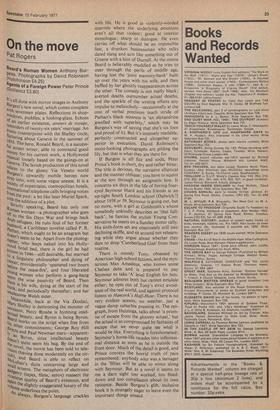On the move
Pat Rogers Beard's Roman Women Anthony Burgess. Photographs by David Robinson (Hutchinson £4.25) Agents of a Foreign Power Peter Prince (Gollancz 23.80) It's all done with mirror images in Anthony burgess's new novel, which comes complete With seventeen plates. Reflections in shopwindows, puddles, a looking-glass. Echoes eir a.n earlier existence, amours de voyage, reminders of twenty-six years' marriage. An fluttering counterpoint with the Shelley circle, nintittering about Geneva in the summer of ,1'16. The hero, Ronald Beard, is a success11J1 screen writer, able to command good Money for his current work, a Hollywood rrlitisical loosely based on the goings-on at ''etleva, The lavish production of this novel relates to the glossy Via Veneto world Ilrgess's upwardly mobile heroes now stray into, with some vague unease. It is a s,c)eie.tY of expatriates, cosmopolitan hotels, international telephone calls bringing voices from the past : a bit like later Muriel Spark, with the addition'of a plot.
Strictly speaking, Beard has only one
Roman woman—a photographer who goes c'ff to the Six Days War and brings back husband refugees. He runs foul of her former nusband, a Caribbean novelist called P. R. Pathan which ought to be an anagram but
c'esn't seem to be. Apart from the photog
rapher, who leaps naked into his HollyWood hotel bed, there is the girl he had ic t "wn in 1946—still desirable, but married c° a linguistic philosopher and dying of 4,11cer. providentially 'spattered two hours yore the cease-fire', and four liberated n' ii"ttrig women who perform a gang-bang Nn the wise passivity of Beard. Then 'here is his wife, dying at the start of the book
and periodically thereafter; and her wnolesome Welsh sister.
uMeanwhile, back at the Via Diodati, i."arY Shelley is dethroning the monster of i iellreason, Percy Bysshe is hymning intelticetual beauty, and Byron is being Byron. ard works on the script when free from :s other commitments; George Roy Hill iyreets and Paul Newman stars—apparentdc,as Byron, since intellectual beauty quite seem his bag. By the end of n°vel, the movie has been sold to tele eLlOri (having done moderately on the cirmlt), and Beard is able to reflect on stricLullan's dicta concerning large and gadall screens. The metaphors of electronic betrY (tapes, films, xerox) reassert the vicar; kgai el'IS quality of Beard's existence, and the slightly exaggerated luxury of the ulne underlines the point. As always, Burgess's language crackles with life. He is good at violently-worded quarrels where the underlying emotions aren't all that violent ; good at interior monologue; sharp in dialogue. He even carries off what should be an impossible feat, a drunken businessman who talks dated slang and acts like something out of Greene with a hint of Durrell. At the centre Beard is believably muddled as he tries to steer through the perils of middle age, having lost the 'joint memory-bank' built up over the years with his wife, and then baffled by her ghostly reappearances across the ether. The comedy is not really black ; averted deaths outnumber actual deaths, and the sparkle of the writing offsets any impulse to melancholy—occasionally at the cost of verbal precision (each stride of Pathan's black mistress is `an alexandrine jewelled with superbity,' which may be Burgess's way of saying that she's six foot and proud of it). But it's intensely readable, perfectly constructed and altogether superior in execution. David Robinson's moist-looking photographs are gilding the lily, but that is what they are there for.
If Burgess is all fizz and soda, Peter Prince's book is short, dry and rather bitter. The title is devious, the narrative elliptical and the manner oblique; you have to squint at the text through an astigmatic lens. It concerns six days in the life of boring foureyed Seymour Hurd and his friends at an up-tight South London school (Dulwich?) about 1958 or 59. Seymour is going out, but no more, with a girl at Goldsmith's whom somebody unkindly describes as 'that fullback"; he fancies the stylish Young Conservative he meets on a Sunday motor rally. His sixth-form set are obstinately still into declining skiffle, and sit around not rehearsing while they argue about whether they dare to drop 'Cumberland Gap' from their routine.
There is moody Tony, obsessed by American high-school fictions, and the mysterious Max Amadeus, who knows some Chelsea debs and is prepared to pay Seymour to take 'A' level English for him. Seymour admires both but cannot emulate either; he opts out of Tony's strict avoidance of the real world, and against protocol listens to Hancock's Half-Hour, There is no very evident season, no weather, just a vague damp suburbia pressing in. The epigraph, from Huizinga, talks about 'a promise of escape from the gloomy actual,' but the actual is so compromised by fantasies of escape that we never quite see whal it would be like. Everything is foreshortened; Seymour's home-life recedes into infinitesimal distance as soon as he is outside the front door. Much of the detail is good, and Prince conveys the horrid truth of pain remembered: anybody who was a teenager in the 'fifties will be able to wince along with Seymour. But as a novel it Seems to me a darn sight too worked, too fineddown and too complacent about its own reticence. Beside Burgess's glib, inclusive book it is strangely eager to leave even the important things unsaid.


































 Previous page
Previous page